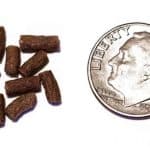As the pancreas is responsible for digestion, feeding your dog food that can be easily assimilated is key for relieving strain on their pancreas and decreasing workload. This will reduce their workload.
Diets that meet these criteria typically contain foods with lower fat and greater digestibility, using meat products from high quality brands rather than plant protein supplements as sources for proteins.
Contents
Low Fat
Acute pancreatitis typically results from eating too much turkey fat or experiencing trauma to the abdomen, but can also be brought on by drugs, toxins, high levels of blood fat levels or pregnancy. Acute pancreatitis should always be taken seriously – if you suspect your dog has it seek veterinary advice immediately!
Your vet will prescribe fluids and medication to treat acute symptoms of pancreatitis in your dog – if these symptoms become life threatening they may need to stay at hospital for some days or more.
Your vet will then recommend a diet to aid your dog in recovering from acute pancreatitis and prevent future flare ups, likely including Hill’s Prescription Diet i/d or Royal Canin Gastrointestinal Low Fat as a suitable option. Be mindful when giving treats, snacks and table scraps high in fat; use our Treat Directory as a source for low-fat treats!
Highly Digestible
Treatment for pancreatitis requires attacking its root cause: inflammation. A holistic vet or pet nutritionist can be invaluable, working closely with both you and your pup to find appropriate foods and supplements for them to alleviate symptoms.
Finding highly digestible foods will help to relieve pancreatic strain. Fatty sources should come from animal sources rather than plant sources as these tend to be harder for pancreas breakdown.
Make sure to add omega 3 fatty acids into their diet as these can help to reduce inflammation. A concentrated pharmaceutical-grade omega 3 oil or even fresh oily fish like sardines and sprat can be an excellent source of these essential fatty acids; adding fruit is also recommended, since this will be easier for their bodies to absorb.
No Table Scraps or Fatty Foods
If your dog suffers from pancreatitis – either acutely or chronically (recurring over time), it’s essential that they eat a low fat diet to prevent another flare up and table scraps or treats that could trigger another episode of pancreatitis.
When selecting food, prioritize meat from ethically raised and slaughtered animals as this may aid in managing inflammation and other symptoms. Omega fatty acid supplements may also be helpful; there are even pharmaceutical grade oils available which offer anti-inflammatory benefits without needing to add large amounts of fish oil directly to your pup’s food.
Your dog will best be able to tell if their new diet is working by how much they enjoy it – an indication would be an increase in appetite with less vomiting and abdominal discomfort. If this doesn’t seem to be happening, contact your vet.
Small Meals
If your dog is struggling with pancreatitis, try feeding smaller meals more frequently to decrease vomiting bile which has time to build up in their empty stomach. Doing this may also help them stay hydrated better and improve recovery time.
Diet is key for quick and full recovery from pancreatitis. By eating foods low in fat and avoiding anything that could further inflame, one can minimize pancreas stress while speeding recovery time and improving recovery success.
A balanced raw diet for your pet may be ideal. Make sure it includes muscle meat (with organs and bones), egg whites, barley, cooked vegetables and some fruit for optimal results – read labels carefully if pre-made raw foods contain too much fat! For additional advice or support regarding what might work best, reach out to a holistic vet or an accredited pet nutritionist.



